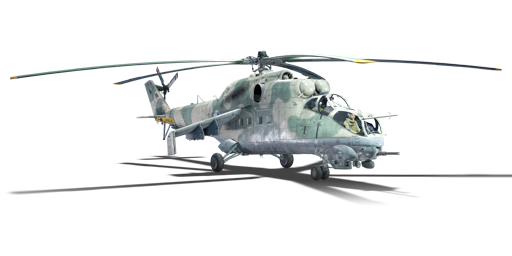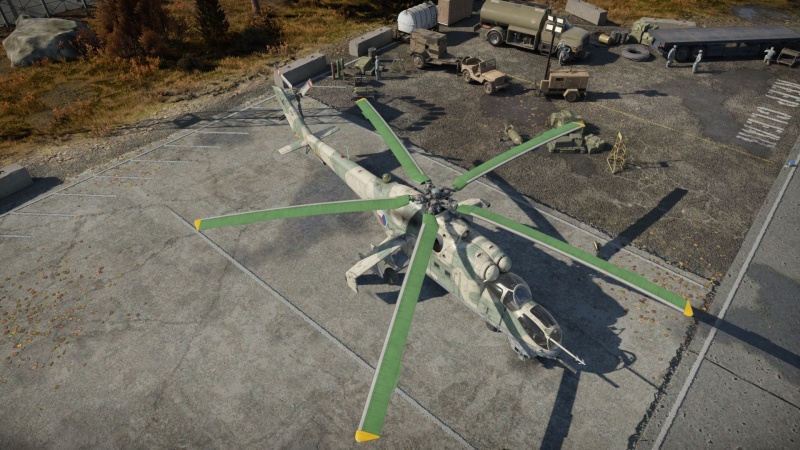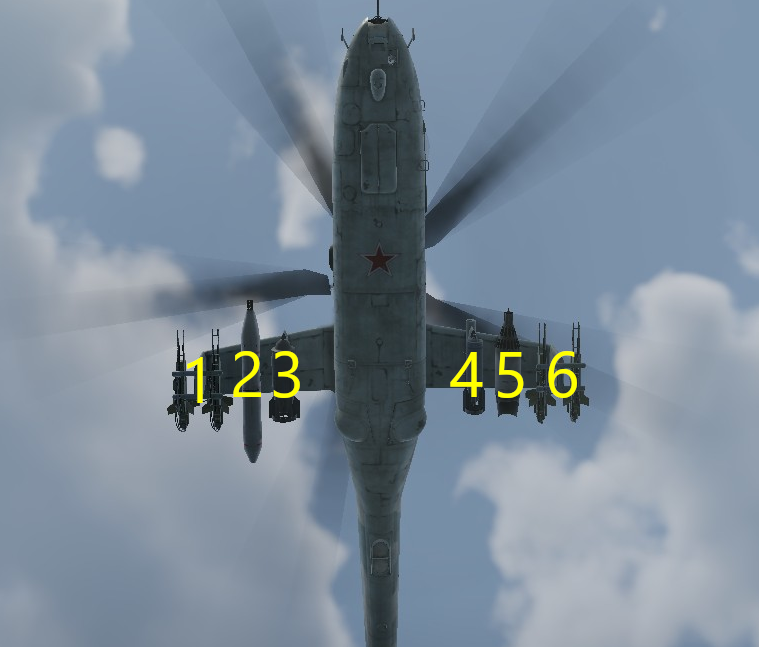Difference between revisions of "Mi-24D (USSR)"
U106897709 (talk | contribs) m (→Description) (Tag: Visual edit) |
U107468880 (talk | contribs) (Description: store info) |
||
| (One intermediate revision by one other user not shown) | |||
| Line 15: | Line 15: | ||
The '''{{Specs|name}}''' (NATO reporting name: ''Hind-D'') was introduced as a [[wt:en/news/5712-shop-pre-order-bundles-and-packs-for-major-update-1-81-en|premium pack]] in [[Update 1.81 "The Valkyries"]]. It is a very versatile helicopter in both the attack and support roles. Don't let the massive airframe fool you, the pair of Klimov TV3-117V turboshaft engines coupled to the 5-bladed rotor give the Hind-D very good lifting power, handling, and decent flight speeds for its weight class. The chin-mounted 12.7 mm turret has a wide gimbal range, and the wide array of ordnance the Hind can carry ranging from gunpods and ATGMs to unguided rockets and bombs will rain hell on enemy tanks in mixed battles. It is also worth mentioning that being a member of the Hind family, the Mi-24D is very well-armoured and has overall decent survivability against machine guns and smaller calibre autocannons. | The '''{{Specs|name}}''' (NATO reporting name: ''Hind-D'') was introduced as a [[wt:en/news/5712-shop-pre-order-bundles-and-packs-for-major-update-1-81-en|premium pack]] in [[Update 1.81 "The Valkyries"]]. It is a very versatile helicopter in both the attack and support roles. Don't let the massive airframe fool you, the pair of Klimov TV3-117V turboshaft engines coupled to the 5-bladed rotor give the Hind-D very good lifting power, handling, and decent flight speeds for its weight class. The chin-mounted 12.7 mm turret has a wide gimbal range, and the wide array of ordnance the Hind can carry ranging from gunpods and ATGMs to unguided rockets and bombs will rain hell on enemy tanks in mixed battles. It is also worth mentioning that being a member of the Hind family, the Mi-24D is very well-armoured and has overall decent survivability against machine guns and smaller calibre autocannons. | ||
| − | The Mi-24D was removed from sale after the [[wt:en/news/6542-shop-the-new-year-sale-en|2019 New Year Sale]]. It has since | + | The Mi-24D was removed from sale after the [[wt:en/news/6542-shop-the-new-year-sale-en|2019 New Year Sale]]. It has since been made available briefly for purchase with Golden Eagles {{ge}} for its [[wt:en/news/8005-wiki-back-on-sale-mi-24d-en|2022 War Thunder Wiki video review]], the [[wt:en/news/8483-special-the-mi-24d-returns-to-celebrate-the-anniversary-of-its-first-flight-en|2023 anniversary of its first flight]], and the [[wt:en/news/9100-shop-three-variants-of-the-mi-24-are-available-at-a-discount-to-mark-the-anniversary-of-its-first-flight-en|2024 "55th anniversary of its first flight"]] event. |
== General info == | == General info == | ||
Latest revision as of 20:44, 23 September 2024
| This page is about the premium Soviet attack helicopter Mi-24D (USSR). For other versions, see Mi-24 (Family). |
Contents
Description
The Mi-24D is the definitive variant of the infamous Mi-24 "Hind" helicopter. Being designed to specifically be a "gunship" variant designed in 1973, the Hind-D had a redesigned frontal fuselage: the single piece cockpit from the Mi-24A was redesigned with two separate cockpits for both a pilot and a gunner to have clear view of the battlefield. The Mi-24D had the required fire-control system to carry various 57 mm rocket pods, UPK-23 gunpod, and 9M17 Falanga ATGMs. The Mi-24D would become one of the most widely exported variants around the world. Czechoslovakia would receive their Mi-24Ds in the '80s, and the Hind-Ds would be passed on to the successor Czech Republic in 1993. The Hind-Ds have started becoming obsolete in recent years, and in 2023 a majority were transferred to Ukraine.
The ▂Mi-24D (NATO reporting name: Hind-D) was introduced as a premium pack in Update 1.81 "The Valkyries". It is a very versatile helicopter in both the attack and support roles. Don't let the massive airframe fool you, the pair of Klimov TV3-117V turboshaft engines coupled to the 5-bladed rotor give the Hind-D very good lifting power, handling, and decent flight speeds for its weight class. The chin-mounted 12.7 mm turret has a wide gimbal range, and the wide array of ordnance the Hind can carry ranging from gunpods and ATGMs to unguided rockets and bombs will rain hell on enemy tanks in mixed battles. It is also worth mentioning that being a member of the Hind family, the Mi-24D is very well-armoured and has overall decent survivability against machine guns and smaller calibre autocannons.
The Mi-24D was removed from sale after the 2019 New Year Sale. It has since been made available briefly for purchase with Golden Eagles ![]() for its 2022 War Thunder Wiki video review, the 2023 anniversary of its first flight, and the 2024 "55th anniversary of its first flight" event.
for its 2022 War Thunder Wiki video review, the 2023 anniversary of its first flight, and the 2024 "55th anniversary of its first flight" event.
General info
Flight performance
| Characteristics | Max Speed (km/h at 1,000 m) |
Max altitude (metres) | |
|---|---|---|---|
| AB | RB | ||
| Stock | 315 | 304 | |
| Upgraded | 354 | 335 | |
Survivability and armour
- Self-sealing fuel tanks
- 4 mm Steel protecting engines, transmission, topmost fuel tank
- 4 mm Steel alongside length of crew compartment
- 8 mm Steel in front and astride gunner position
- 55 mm Bulletproof glass, front of canopy only
Modifications and economy
Armaments
| Ballistic Computer | ||
|---|---|---|
| CCIP (Guns) | CCIP (Rockets) | CCIP (Bombs) |
| |
|
|
Offensive armament
The Mi-24D (USSR) is armed with:
- A choice between three presets:
- 1 x 12.7 mm YaK-B machine gun, chin turret (1,470 rpg)
- 1 x 12.7 mm YaK-B machine gun + 128 x countermeasures
- 1 x 12.7 mm YaK-B machine gun + 128 x countermeasures + IRCM
Suspended armament
The Mi-24D (USSR) can be outfitted with the following ordnance:
| 1 | 2 | 3 | 4 | 5 | 6 | ||
|---|---|---|---|---|---|---|---|
| 23 mm GSh-23L cannons (250 rpg) | 1 | 1 | 1 | 1 | |||
| 250 kg OFAB-250sv bombs | 1 | 1 | 1 | 1 | |||
| 500 kg FAB-500M-54 bombs | 1 | 1 | |||||
| S-5K rockets | 32 | 32 | 32 | 32 | |||
| S-24 rockets | 1 | 1 | 1 | 1 | |||
| 9M17M Falanga missiles | 2 | 2 | |||||
| Maximum permissible weight imbalance: 480 kg | |||||||
| Default weapon presets | |
|---|---|
| |
Usage in battles
The Mi-24D, is the equivalent of the ancient Rome's cataphractarii: it's heavily armoured and packs incredible firepower. The Hinds are one of the scariest helicopters in the game, whether in Air or Ground attack, or even in naval.
Air to Air
Mi-24D Vs. Helicopters
The Mi-24D is able to make quick work of enemy helicopters, with its 12.7 mm YaK-B rotary machine gun. To get the best bullet to knock-out ratio - always aim for the critical elements of the rival.
- Flight deck
- Engine
- Tail
Or if you wish to play with the enemy helicopter, shoot it's wings off with a few well placed shots and it will lose all it's suspended armament. However, doing this will not knock out any machine guns or cannons which it has mounted below on the airframe. Using the ATGMs to destroy enemy helicopters, the Falanga-PV are one of the fastest missiles in the game - they are able to destroy most helicopters with one hit - however helicopters such as Ka-52, Mi-28N & Tiger HAD will need to hit the tail, flight deck or engine since they are heavily armoured.
The Mi-24D has 14 Suspended armament presets, from cannons to ATGMs combinations.
The recommended armaments for this role is:
- 64 x S-5K rockets + 4 x 9M17M Falanga missiles + 2 x 23 mm GSh-23-2 cannons
The extra cannons installed on the wings, allows the Hind to perform the role of an attack helicopter - these cannons are able to destroy enemy helicopters, within a few clicks of the mouse. However, if this is used in an air-to-ground role these cannons can only penetrate lightly armoured vehicles.
If playing this in an air-to-ground role it's best to go for the
- 128 x S-5K rockets + 4 x 9M17M Falanga missiles
Mi-24D Vs. Fighters
The Mi-24D does not have any air-to-air missiles, this means engagement with jet fighters will most likely end up with the Hind getting knocked out. However, it is not impossible to shoot them down. To do this, make sure you are equipped with the ATGMs. Wait for the aircraft to approach you head on and fire, keep the ATGM lined up with aircraft and a few seconds later it should hit.
If the aircraft has missiles, nose over the Mi-24D, gain speed, lots of speed - faster you can do this, higher the odds of the jet missing. Drop the Mi-24D to the ground and pull up after the jet has overshot you. If the jet banks and turns around, fire the ATGM and correct the ATGM so it hits the aircraft during this turn.
Air to Ground
The best payload for combined battles is
- 128 x S-5K rockets + 4 x 9M17M Falanga missiles
When enemy tankers see the Hind coming towards them, or see it flash up on the hud, they flea for cover. The Mi-24D, provides four ATGM (Falanga-PV) missiles - these are -well aimed - enough to knock out up to four enemy tanks, with a single hit. The range of the Falanga-PV missiles allow for strikes to happen at a distance, which keeps the helicopter out of range from most enemy SPAA or tanks.
Mi-24D Vs. SPAA
However the first target if seen, should always be enemy SPAA vehicles. Once the SPAA units have been located and knocked out, it is free hunting. The Mi-24D provides 128 S-5K rockets with its eight Falanga-PV missiles. These 128 rockets provide the capability for at least another two enemy tanks to be knocked out. With a skilled shot, it is EVEN possible that over four or five plus enemy tanks can be destroyed using them, on top of the eight ATGMs.
The Mi-24D is a very large helicopter, it's not a small sleek stealthy helicopter like the BO 105 It is a big target - In-order to compensate, fly low and fast. Stay above the tree line, under 20 m so any fussed missiles cannot detonate with their proximity fuses. Proximity fuses do not need to directly hit you, for them to knock you out, they only have to explode within the proximity of the helicopter.
Pros and cons
Pros:
- Extensive payload options, including lethal S-24 rockets
- Excellent ATGM penetration at 650mm
- Well armoured against small arms fire
- Quick-firing machine gun capable of shredding very light armour
- Premium vehicle reward bonuses for RP and SL
Cons:
- No air-to-air missiles
- Limited ATGM firing arcs at close ranges
- Very visible, with large radar cross section
- Sluggish to manoeuvre at most speeds
- No thermal optics, only early NVG
History
Work started in 1971 on improving the layout of the Mi-24A/B helicopter in Soviet service. Complaints stemmed from the cockpit design, which was regarded as obstructive to the pilot and the weapon system operator's (WSO) view and also having insufficient level of protection for the crew.[1] Two early-production Mi-24A models were converted into the new design in 1972, which became distinguishable by their starboard-side tail rotor.[2] The redesigned helicopter saw the cockpit arrangement transformed into a stepped tandem cockpit, which saw the WSO placed in front, slightly lower, of the pilot. The new arrangement allowed for better, unobstructed view for both pilot and WSO, while having a better armour envelope around the crew. The new layout also allowed the additions of LLLTV and FLIR sensors on the helicopter, which saw the nose gear lengthened to allow enough ground clearance for the additions.[1]
The new Mi-24 variant with the stepped tandem cockpit was intended to receive the Mi-24V ("V" being the third letter in the Cyrillic alphabet). However, the intended Shturm-V missile was not available for the new helicopter.[1] In an interim solution, the helicopter would retain the weapon systems found on the Mi-24B (which consisted of a USPU-24 turret with YakB-12.7 machine guns and the capability of being equipped with 9M17M Falanga ATGMs[3]). This interim helicopter design would be known as the Mi-24D, or by the designation Izdeliye 246. The Mi-24D would begin production in 1973 at the Arsenyev plant and Aviation Plant No.168. After performing in state tests in 1974, the Mi-24D would be put into the Soviet Air Force service in March 29, 1976. The helicopter would serve not only with the Soviet Union, but for its export clients as well.[2]
A trainer version of the Mi-24D, the Mi-24DU Izdeliye 249 was also produced that had the WSO position adapted to hold an instructor pilot instead.[2] Both the Mi-24D and Mi-24DU production at the two factories for both Soviet and export clients account for at least 625 units.[1]
Service in other nations
Czechoslovakia
The Czechoslovakian Army received 28 Mi-24Ds, delivered between August 1978, and by 1982. Between 1985 and 1989 two training Mi-24DUs were purchased (as well as 31 units of the modernized Mi-24V). Upon the dissolution of Czechoslovakia in 1993 the inventory of Mi-24s were split, with the now Czech Republic Army receiving 16 Mi-24D and one Mi-24DU (also 20 Mi-24V). In 2003, all the Mi-24D helicopters were retired. [4]
To replace the old Mi-24Ds, the Czech government purchased US-made AH-1Zs. Some of the inventory Mi-24Ds were donated to Ukraine.[5]
Bulgaria
The Bulgarian Air Force have a fleet of 38 Mi-24Ds originally delivered between 1979-1985, during 1999 the Mi-24Ds in service were reduced. The type has suffered from a significant lack of serviceability due to the limited supply of otherwise vital and expensive spare parts, such as rotor blades, as well as expired engine and airframe time between overhauls.
Bulgarian Mi-24D sold to other countries/companies:
- Between 2002–2004 dozens of Mi-24Ds were sold to local arms trade companies.
- 6 were delivered to the US and 2 went to the Ivory Coast in 2003.
- 6 Mi-24Ds followed suite to Mali between 2007-2010 after having completed overhaul.
- 5 Mi-24Ds were sold out by the Bulgarian MoD to Metalika-AV in December 2011, and by late 2017 at least 4 of these had been returned to airworthy condition.
- In 2017–2018 three were sold out to the Ivory Coast and one went to Burkina Faso in 2018, followed by another helicopter in 2019.
In 2004, the Bulgarian MoD moved forward with a tender covering the comprehensive upgrade and life extension of 6 Mi-24Ds – all of these helicopters were delivered in 1985 and 1986.[5]
Hungary
The Hungarian Air Force have a fleet of 30 Mi-24Ds received by the former Soviet Union between 1978-1985.[5]
Media
- Skins
- Videos
See also
- Related development
- Similar vehicles
External links
References
- Citations
- Bibliography
- Gordon, Yefim and Dimitriy Komissarov. 2001. Mil Mi-24 Hind Attack Helicopter. United Kingdom: Airlife Publishing Ltd.
- Mladenov, Alexander. 2010. MIL Mi-24 Hind Gunship. Great Britain: Osprey Publishing. Kindle.
- Mladenov, Alexander. 2020. "Mi-24s still serving in Eastern Europe". New Defence Order Strategy. Last modified August 20, 2022. Website (Archive)
- Soušek, Tomáš. n.d. "Mi-24 v letectvu končí". Magnet Press. Accessed December 11, 2021. Website (Archive)
| Mil Moscow Helicopter Plant | |
|---|---|
| Attack | Mi-4AV |
| Mi-8AMTSh · Mi-8AMTSh-VN · Mi-8TV | |
| Mi-24A · Mi-24P · Mi-24V | |
| Mi-28N · Mi-28NM | |
| Mi-35M | |
| Export | ◊Mi-8TB |
| ▂Mi-24D · ◔Mi-24D · ◔Mi-24V · ◔Mi-24P · ◊Mi-24P · ◄Mi-24P HFS 80 · Superhind | |
| Mi-28A | |
| ▄Mi-35M | |
| USSR helicopters | |
|---|---|
| Attack | |
| Hound | Mi-4AV |
| Hip | Mi-8AMTSh · Mi-8AMTSh-VN · Mi-8TV |
| Hind | Mi-24A · ▂Mi-24D · Mi-24P · Mi-24V · Mi-35M |
| Havoc | Mi-28N · Mi-28NM |
| Helix | Ka-29 |
| Hokum | Ka-50 · Ka-52 |






